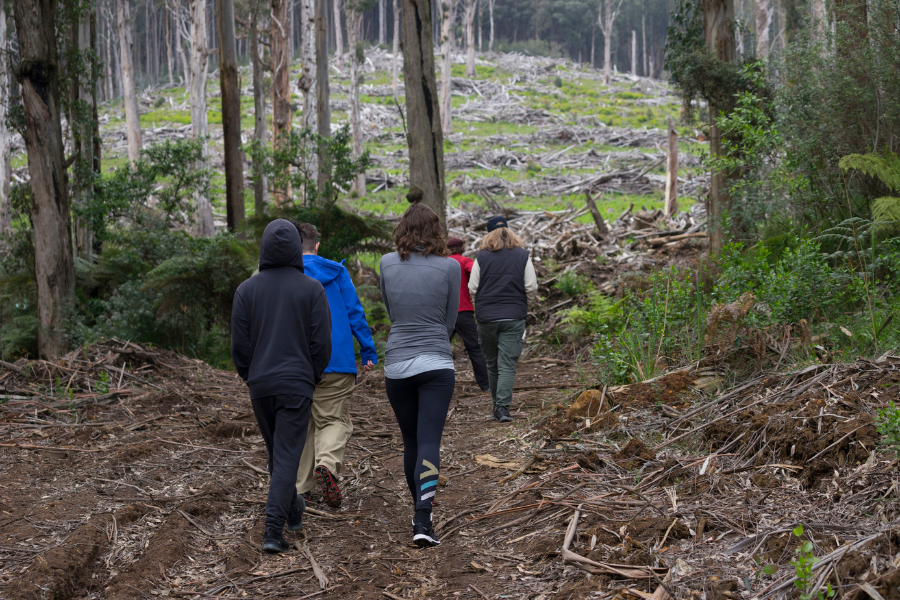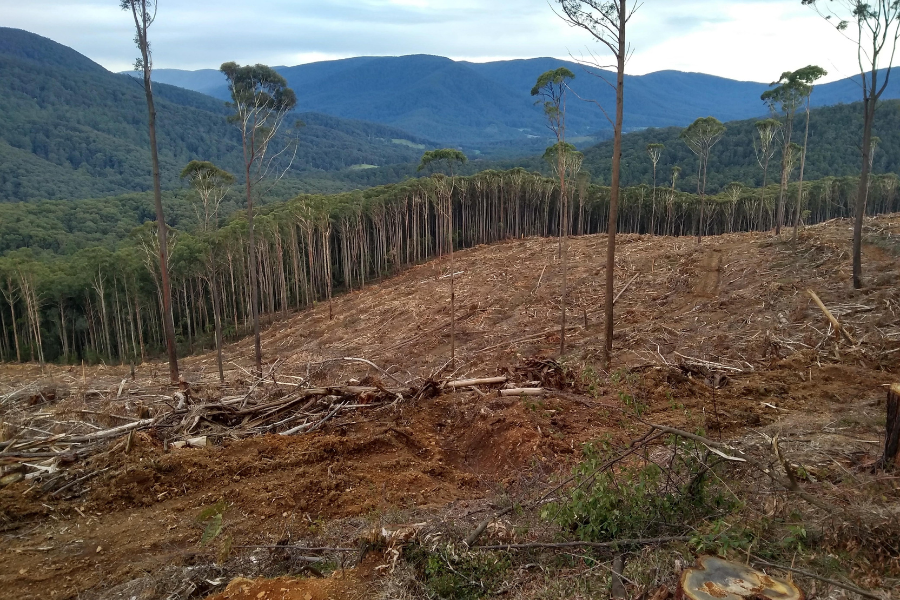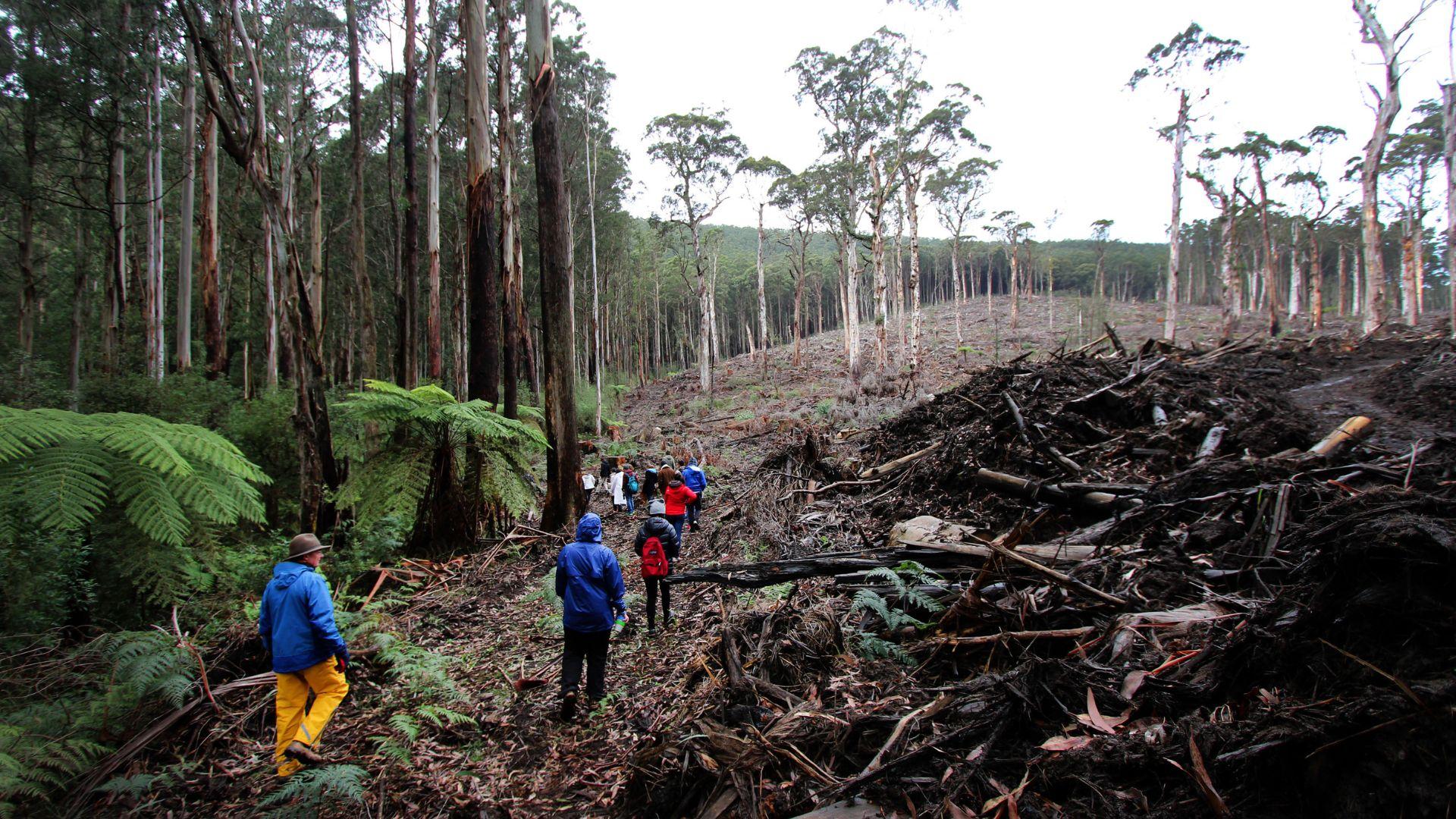News - 05 August 2022
Draconian fines and 12 months in jail for peaceful protest won’t clean up unsustainable timber and packaging supply chains

The Victorian parliament has enacted draconian new penalties initiated by the Andrews government for action to highlight and prevent logging in forests recovering from bushfires, and forests that are home to endangered species. Citizen science and peaceful protest near forest logging sites, could now attract penalties up to $21,000 or a year in jail
Peaceful protest and the right to protest—especially in public places—is a central pillar of healthy democracy. Across the continent it has played a key role in protecting forests Australians know and love, like the Tasmanian World Heritage Forests, the Daintree in Queensland, Terania Creek in northern NSW, Goolengook in Victoria’s East Gippsland, and WA’s southern forests
Citizen scientists have time and again exposed failures in forest management for protecting threatened species and forests, as well as breaches of state and federal environmental law—raising key questions about legality in supply chains and mitigating biodiversity risk
Instead of penalising concerned citizens, the Andrews government must bring forward the Victorian industry’s planned 2030 exit from native forests, including an immediate reduction of wood volumes
Rather than rolling out an anti-society and anti-environment playbook punishing community activists, the Victorian parliament should stand up to vested corporate interests. It should strongly regulate outmoded native forest logging, address the staggering unsustainability of wood supply from Victorian native forests and bring forward the industry’s planned 2030 exit from native forests.
State and Commonwealth governments are failing to enforce environmental regulation in logging operations. Citizen scientists and regional conservation groups have had to work tirelessly to fill the gap and properly survey for threatened species in order to hold logging agencies to account for breaches to environmental law to protect threatened species habitat.
In May 2020, the Federal Court found a number of logging operations had breached Victorian law and directly contributed to the decline of the Critically Endangered Leadbeater’s Possum and the Endangered greater glider. It’s a finding that has subsequently been upheld by the courts upon appeal.
There are currently nine other community initiated court cases highlighting issues of legality with logging. These cases allege widespread breaches of environmental law, such as the logging of habitat to bushfire-affected threatened species like the Endangered greater glider, causing serious and irreversible damage. These community-led court cases raise serious questions around the legality of logging and demonstrate how concerned citizens are increasingly relying on the judicial system due to consistent government inaction.
This scrutiny through the courts is clearly uncomfortable for the Andrews government. It should be facing up to the unsustainability of continuing logging-business-as-usual after successive bushfire events since the turn of the century, but instead is focussed on keeping the weak and unpopular logging ship sailing and dimming the light shone on that logging. The Victorian government should be responding with strong enforcement and regulation to protect and restore forests and endangered species habitat, but has thus far bowed to pressure and watered down environmental protections. This will continue wood supply at unsustainable levels—predominantly to international pulp and packaging company Nippon Opal.

Now, in its latest move, the Andrews government has introduced new laws cracking down on citizen science and democratic rights to peacefully protest near logging sites. They will facilitate the unsustainable supply of wood volumes from high conservation value forests to meet the expectations of corporate interests.
These changes introduce harsh penalties for concerned members of the community, are plainly disproportionate as well as undermining democratic rights.
The laws not only threaten members of the public with extraordinary fines and imprisonment for simply entering a logging coupe, but also give authorised officers increased powers. There are also additional fines for possession of certain items in timber harvesting areas.
Authorised officers will be given the power to search people’s bags and vehicles for PVC pipes, as well as the power to issue protesters with banning notices, preventing them from further entering logging sites.
Citizen scientists will also be impacted by this Bill, as it will hinder people completing important surveys for threatened wildlife and plants in forests subject to logging.
Instead of penalising concerned citizens, the Victorian government should stand up to vested corporate interests and
Address the systematic failure to regulate logging operations and instead enact strong environmental laws, enforced by an independent conservation regulator
Address unsustainable wood supply to Nippon Opal (which pulps vast quantities of forest for paper and packaging) through supporting an immediate transition to plantation and recycled fibre and abolishing the legislated wood supply contract (Wood Pulp Agreement Act)
Bring forward the Victorian industry’s planned 2030 exit from native forests, including an immediate reduction of wood volumes
Respect the value and support participation in citizen science and the democratic right to peaceful protest
These actions are important steps in addressing the real issues: unsustainable wood supply from Victoria’s forests; disproportionate corporate power over government; and uncertainty for forward-looking businesses and retailers wanting to remove exposure to risk of unsustainable and illegal and potentially illegal logging within their supply chains.

What’s happened
On 4th August 2022, legislation initiated by the Andrews government was passed (Sustainable Forests Timber Amendment (Timber Harvesting Safety Zones) Bill 2022) bringing penalties of up to $21,000 or 12 months jail community members entering the vicinity of planned or active logging on public land.
There are also now new powers to search vehicles or bags for items relating to broadly defined logging site offences and powers to seize items.
The legislation also introduces Banning Notices, which compel a member of the public to leave and not return to a forest site in public state forests, or otherwise face heavy penalties.
What it means
These changes hinder access for citizen scientists conducting important surveys for threatened wildlife and plants in the vicinity of logging sites. These surveys play a vital role in understanding where threatened species live and how populations change over time.
The democratic right to peaceful protest is undermined, with deterrents and punishments involving jail terms being introduced in an effort to stop concerned citizens from protesting the destruction of important forests. This erosion of rights is part of a worrying national trend. Similar laws have been introduced in New South Wales, Queensland, and Tasmania, targeting members of the community protesting peacefully on climate and forests with heavy-handed penalties. The right to peaceful protest is a core democratic value that must be protected rather than undermined. Access to the judicial system is a key community right, as third-party scrutiny on decisions that affect the environment allow citizens to hold the government to account.

The true beneficiaries of these changes are corporations in the native forest logging supply chain that have established disproportionate power over governments in order to serve their own interests. Nippon Opal is the largest buyer of the most logs from Victoria’s public native forests, pulping vast amounts of forest for paper and packaging. The Victorian government has guaranteed Nippon Opal a minimum supply of native forest logs in the hundreds of thousands of tonnes through to 2030. Nippon Opal and other corporations rely on government complicity in providing these vast amounts of wood, and a form of greenwash at the expense of democratic rights—when forests should be managed for wildlife and the benefit of the whole community.